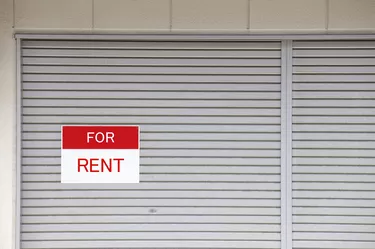
Buying and maintaining investment properties is an expensive business. Real estate investors, namely landlords, can increase their profits from rental property by taking advantage of the many tax breaks available. Owners can deduct all or part of the cost of owning single-family or multi-family rentals. Investors should consult with a tax professional to determine how exactly each tax deduction applies to them.
Deducting Mortgage Interest
Video of the Day
Mortgage interest is one of the largest and most consistent tax deductions for rental property owners. Loans for non-owner occupied homes tend to have higher interest rates than mortgages for primary residences. Because more of your monthly payment goes toward interest in the first several years of a mortgage, your deduction will shrink as you pay off the loan. You can also deduct interest on second mortgages used to improve or repair rental real estate.
Video of the Day
Depreciating Rentals
You can't simply write off the purchase price of a rental property in the year you buy it. Instead, you deduct a portion of the expense of buying an investment property over several years. You recover the cost of acquiring a rental home through a method known as depreciation. Depreciation, or the decrease in your rental home's value which occurs over its useful life due to wear and tear, only applies to the structure itself because the land it sits on doesn't depreciate.
Repairs to Your Rental
Tenants turn to their landlords when a rental needs repairs. You can deduct the cost of ordinary, necessary and reasonable repairs you made to restore the home's condition. However, components that you replace, rather than fix, usually aren't deductible. Replacing or upgrading items in your rental property usually constitutes an "improvement," which makes the home better, instead of simply restoring it.
Costs to Travel
Depending on how involved you are in your rental's day-to-day management activities, you likely spend money going to and from your property. You can deduct the cost of travel for your landlord activities. Amounts you spend to repair, fuel and maintain the vehicle you use to perform your landlord tasks, and hotel, airfare and meal expenses when traveling overnight, are deductible. You can use a standard mileage rate if you choose not to deduct actual vehicle expenses and meet certain other requirements. As of 2014, landlords could deduct 56 cents per mile driven.
Payment for Professional Services
You can deduct wages for property managers and independent contractors who provide services for your rental property. The deduction applies to employee wages, labor costs and commissions or fees for professionals such as real estate brokers, attorneys and accountants.
Deducting Due to Loss
You can deduct losses if your investment property is damaged or destroyed. You can also deduct insurance premiums, such as homeowners or landlord insurance. You usually can't deduct the entire cost of property damage, although you can deduct a portion based on the extent of your losses and the amount covered by insurance. Homeowners insurance covers fires, theft, vandalism and other perils to your rental property's structure. Landlord coverage can also reimburse losses to personal property and provide certain liability coverage.